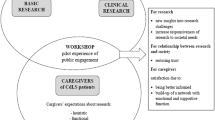Abstract
Background
Relatively few studies have examined how patients with schizophrenia and depression view psychiatric research and what influences their readiness to participate.
Methods
A total of 763 patients (48% schizophrenia, 52% depression) from 7 European countries were examined using a specifically designed self-report questionnaire [“Hamburg Attitudes to Psychiatric Research Questionnaire” (HAPRQ)].
Results
Most patients (98%) approved of psychiatric research, in general, at least “a little”. There was a tendency to approve psychosocial rather than biological research topics (e.g. research on the role of the family by 91% of patients compared to 79% in genetics). Reasons to participate were mainly altruistic. Only a minority (28%) considered monetary incentives important. Patients wanted extensive background information and a feedback of the results; both were significantly more expressed by schizophrenia as compared to depressive patients, although these findings need to be interpreted with care because of age and gender differences between the diagnostic groups.
Conclusion
While patients expressed discerning views of psychiatric research, only few differences were apparent between the two diagnostic groups. Patients’ research priorities are not the same as those of many professionals and funding bodies. Their demonstrated critical appraisal should inform future research ensuring an increased patient role in the research process.
Similar content being viewed by others
References
Angermeyer M, Klusmann D (1988) The cause of functional psychosis as seen by patients and their relatives. The patients point of view. Eur Arch Psychiatry Neurol Sci 238:47–54
Appelbaum PS (2006) Decisional capacity of patients with schizophrenia to consent to research: taking stock. Schizophr Bull 32:22–25
Candilis PJ, Geppert CMA, Fletcher KE, Lidz CW, Appelbaum PS (2006) Willingness of subjects with thought disorder to participate in research. Schizophr Bull 32:159–165
Carey MP, Morrison-Beedy D, Carey KB, Maisto SA, Gordon CM, Pedlow T (2001) Psychiatric outpatients report their experiences as participants in a randomized-controlled trial. J Nerv Ment Dis 189:299–306
Chalmers I (1995) What do I want from health research and health researchers when I am a patient? BMJ 310:1315–1318
Faulkner A, Thomas P (2002) User-led research and evidence-based medicine. Br J Psychiatry 180:1–3
Fossey E, Epstein M, Findley R, Plant G, Harvey C (2002) Creating a positive experience of research for people with psychiatric disabilities by sharing feedback. Psychiatr Rehabil J 4:369–378
Goodare H, Lockwood S (1999) Involving patients in clinical research: improves the quality of research. BMJ 319:724–725
Guy W (1976) ECDEU Assessment manual for psychopharmacology: Publication ADM 76–338. US Department of Health, Education, and Welfare, Washington, DC, pp 218–222
Hall R (1995) Global assessment of functioning: a modified scale. Psychosomatics 36:267–275
Hummer M, Holzmeister R, Kemmler G, Eder U, Hofer A, Kurzhaler I, Oehl M, Weiss E, Fleischhacker WW (2003) Placebo-controlled trials: patients’ attitudes. J Clin Psychiatry 64:277–281
Kaminsky A, Roberts LW, Brody JL (2003) Influences upon willingness to participate in schizophrenia research: an analysis of narrative data from 63 people with schizophrenia. Ethics Behav 13:279–302
Kraus SJ (1995) Attitudes and the prediction of behavior: a meta-analysis of the empirical literature. Pers Soc Psychol Bull 21:58–75
Marshall RD, Spitzer RL, Vaughan SC, Mellman LA, MacKinnon RA, Roose SP (2001) Assessing the subjective experience of being a participant in psychiatric research. Am J Psychiatry 158:319–321
Roberts LW, Warner TD, Brody JL, Roberts B, Lauriello J, Lyketsos C (2002) Patient and psychiatrist ratings of hypothetical research protocols: assessment of harm potential and factors influencing participation decisions. Am J Psychiatry 159:573–584
Roberts LW, Green Hammond KA, Warner TD, Lewis R (2004) Influence of ethical safeguards on research participation: comparison of perspectives of people with schizophrenia and psychiatrists. Am J Psychiatry 161:2309–2311
Roberts LW, Warner TD, Hammond KG, Hoop JG (2006) Views of people with schizophrenia regarding aspects of research: study size and funding sources. Schizophr Bull 32:107–115
Roberts LW, Warner TD, Anderson CT, Smithpeter MV, Rogers MK (2004) Schizophrenia research participants’ responses to protocol safeguards: recruitment, consent, and debriefing. Schizophr Res 67:283–291
Schäfer I, Gschwend C, Karow A, Naber D (2008) Attitudes of patients with schizophrenia to psychiatric research. Int J Psychiatr Clin Pract 12:165–170
Thornicroft G, Rose D, Huxley P, Dale G, Wykes T (2002) What are the research priorities of mental health service users? J Mental Health 11:1–3
Warner TD, Roberts WL, Nguyen K (2003) Do psychiatrists understand research-related experiences, attitudes, and motivations of schizophrenia study participants? Compr Psychiatry 44:227–233
World Health Organization (1992) The ICD-10 classification of mental and behavioural disorders: clinical description and diagnostic guidelines. World Health Organisation, Geneva
Zullino D, Conus P, Borgeat F, Bonsack C (2003) Readiness to participate in psychiatric research. Can J Psychiatry 48:480–484
Author information
Authors and Affiliations
Corresponding author
Rights and permissions
About this article
Cite this article
Schäfer, I., Burns, T., Fleischhacker, W.W. et al. Attitudes of patients with schizophrenia and depression to psychiatric research: a study in seven European countries. Soc Psychiatry Psychiatr Epidemiol 46, 159–165 (2011). https://doi.org/10.1007/s00127-010-0181-7
Received:
Accepted:
Published:
Issue Date:
DOI: https://doi.org/10.1007/s00127-010-0181-7



